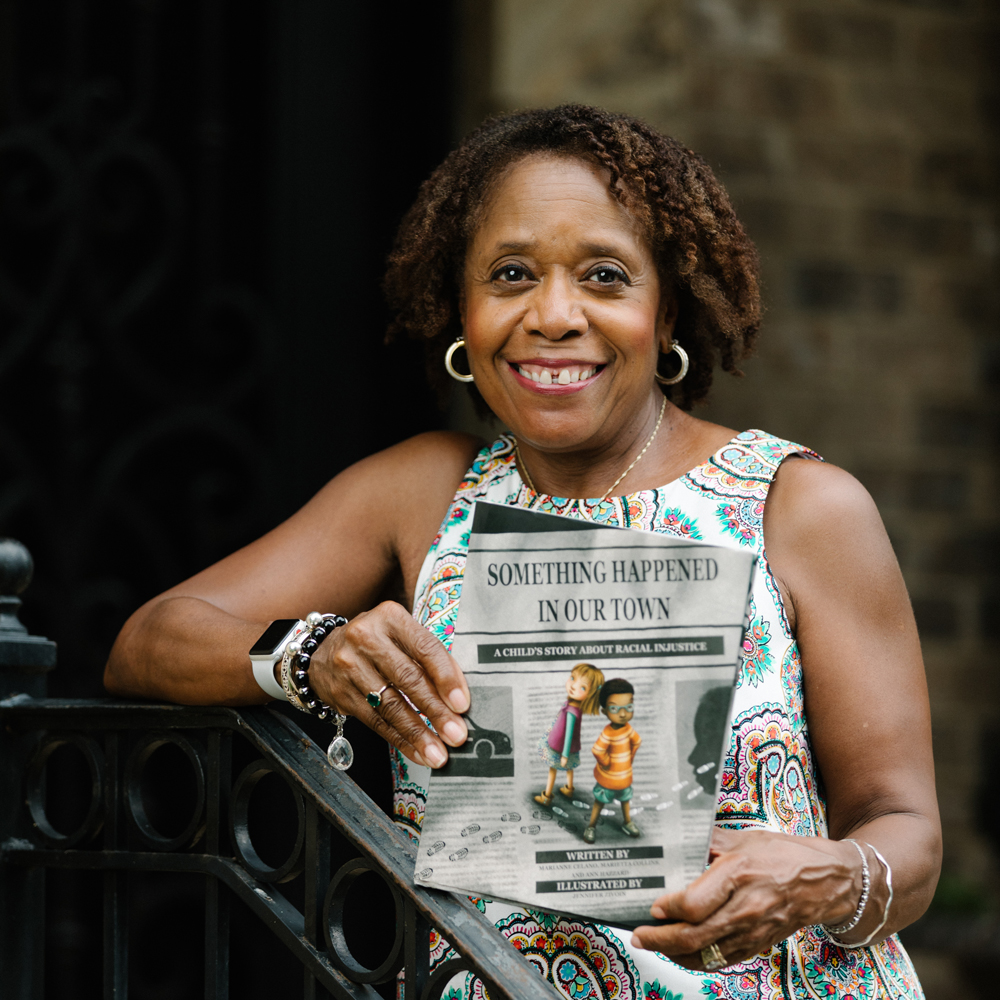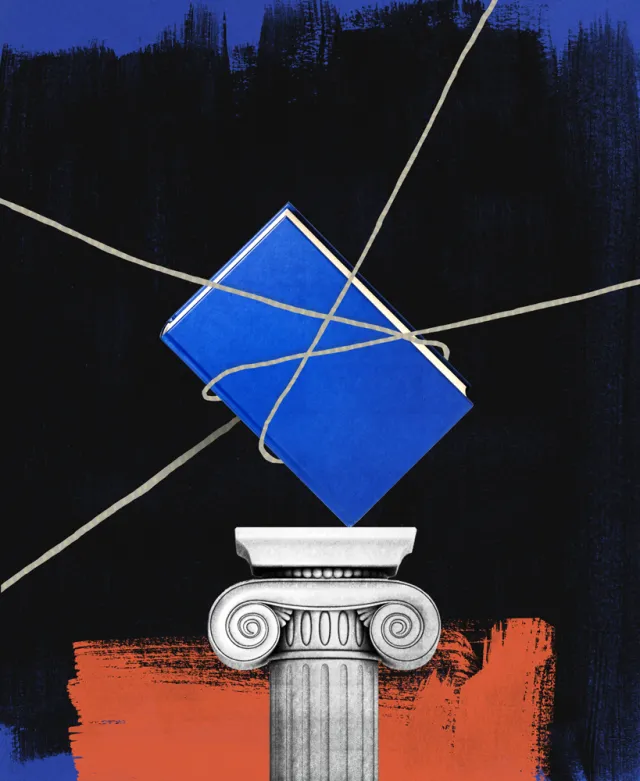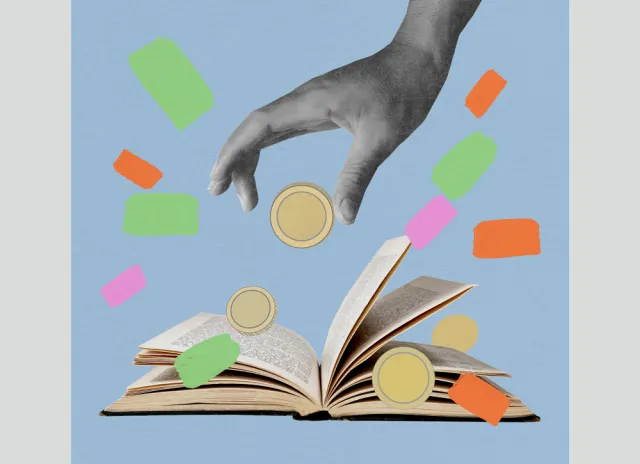Banned!
Alum News
The debate over what constitutes 'appropriate' content jeopardizes the open exchange of ideas.
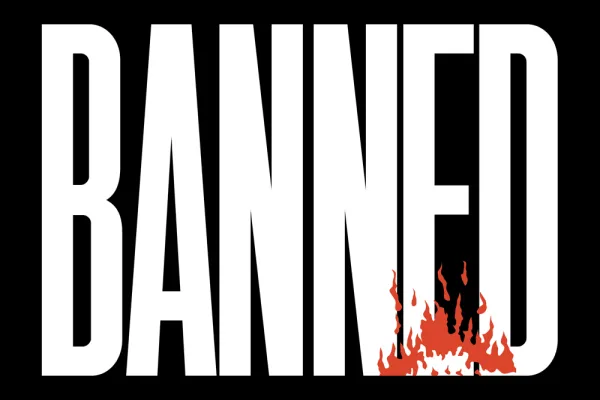
Published November 15, 2022
More than a decade ago, Alex Meyers ’99 decided to pursue a career she hoped would help make the world better. She became a librarian.
Meyers serves about 27,000 residents at Westbank Community Library and a companion branch in Austin, Texas. Although Austin is considered a haven for liberals, Meyers’ library system is on the city’s west side, toward the Hill Country, “where things get a lot more conservative,” she says.
She and her colleagues have not faced any challenges lately to books in the library’s collection. But at Westlake High School, across the street from the main public library, it’s a different story.
The school library has contended with 75 book challenges so far in 2022. “My school librarian colleagues are just being slammed by this,” Meyers says. Some titles are on the American Library Association’s list of the top 10 most challenged books of 2021, including Susan Kuklin’s Beyond Magenta, a collection of interviews with transgender teens. Some are classics, such as Vladimir Nabokov’s Lolita and Toni Morrison’s Beloved.
Many books that parents are protesting at the high school are available steps away at the public library.
What’s happening at Westlake is not unique. This year, the ALA recorded challenges to 1,651 titles from January through August, surpassing 1,597 challenges in all of 2021. Last year set the previous record for the highest number of challenges since the ALA began tracking such data two decades ago. Many of the contested books are about people of color or LGBTQ people, according to ALA spokesperson Raymond Garcia. Why is this happening, and what does it mean for our democracy?
How did we get here?
Book banning in the United States is older than the nation itself, says Michael Thurston, Helen Means Professor of English Language and Literature at Smith. The impulse is “a central part of American culture,” he says, starting with the Pilgrims. They banned material that questioned the theological practices of the Plymouth and Massachusetts Bay colonies.
Later, Anthony Comstock, founder of the New York Society for the Suppression of Vice, feared that what arrived in the U.S. mail could lead people astray. Comstock and his colleagues galvanized the federal government to pass what became known as the Comstock Act of 1873. It prevented information about contraception, among other topics, from showing up in mailboxes.
My Book Was Banned. Here’s My Story.
by Marietta Harvey Collins ’79, M.S.W. ’83
Leaders in Concord, Massachusetts, banned Mark Twain’s Adventures of Huckleberry Finn from school and public libraries after the novel was published in 1885. Huck and other characters were uncouth and a bad influence on young readers, they argued. (Others tried to ban the book a century later for its racist language and depiction of the character Jim, a Black man escaping from slavery.)
From 1918 to 1920, a magazine called The Little Review ran excerpts from James Joyce’s Ulysses. Postal Service censors confiscated and burned three issues for “obscene” content. The editors were prosecuted and found guilty of violating the Comstock Act. They had to stop publishing the novel and pay a modest fine. When the novel was banned in the United States in 1922, determined readers smuggled it into the country. Courts overturned the U.S. ban in 1933.
Officials were so threatened by Allen Ginsberg’s Howl and Other Poems in 1957 that they launched an undercover sting operation against it. A clerk at the City Lights bookstore in San Francisco was arrested for selling an agent a copy of the book. In a high-profile trial, the judge acquitted the clerk and publisher Lawrence Ferlinghetti of obscenity charges, declaring the book to have literary merit.
From the later 1950s through the 1980s, writers and publishers were fairly free to publish what they wished, Thurston says. That trend began to shift by 1989, when two well-known logging families in Laytonville, California, challenged Dr. Seuss’ The Lorax. The tale about environmental protection shouldn’t be part of the second grade curriculum, they maintained, because it portrayed loggers—some of whom were parents in the community—in a bad light.

Book challenges increased in the 1990s, with the Harry Potter series leading the way. Protestors saw its witchcraft “as a threat to American Christianity and the sense of the United States as a specifically Christian nation,” Thurston says. Few books have been more frequently challenged in the 21st century than those of Harry and his friends saving the wizarding world, according to the ALA.
That history led us to this moment, when individuals and conservative groups such as Moms for Liberty coordinate campaigns to ban books. None was challenged more in 2021 than the graphic memoir Gender Queer. Its tale about a character grappling with being nonbinary and asexual includes some explicit sexual images. Dozens of school libraries removed the volume from their shelves. Some opponents have labeled the book pornographic. One community in Michigan decided to withhold funds for its library because Gender Queer and other books with LGBTQ subjects were included in the collection.
Other frequent targets include Angie Thomas’ The Hate U Give, a novel centered on a police shooting of an unarmed Black teenager, and The Bluest Eye, Toni Morrison’s debut, in which a father rapes his daughter.
The upshot? “We have the First Amendment that says Congress shall make no law abridging the freedom of speech,” Thurston says, “and yet we have these efforts to abridge the freedom of expression.”
Illustration by Franziska Barczyk
Where are we now?
More than 70% of voters, including 75% of Democrats and 70% of Republicans, oppose banning books, according to a March 2022 survey by the ALA. Sixty percent of parents oppose the idea; 40% support it in some cases.
Some parents fervently believe they have the right to control what children and teens read, especially from school libraries. Ban offensive books and youth won’t have access to them, these parents say.
“But young people find banned topics irresistible,” says Loretta Ross, an activist and associate professor of the study of women and gender at Smith. “Nothing is more likely to heighten their interest in a topic than to tell them they can’t read it.” She points out that kids have a “walking library in their pockets”—their smartphones—where they can access what they like “regardless of parental controls or condemnation.”
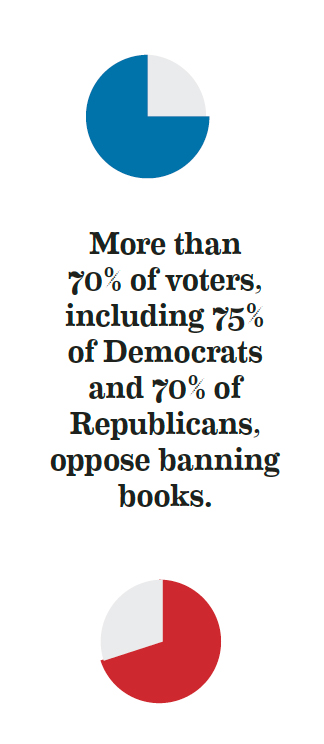
Of the 10 books on the ALA’s 2021 most challenged list, half explore LGBTQ themes. For Jess deCourcy Hinds ’00, that trend is tied to how much progress the LGBTQ community has made legally and culturally. “We’re seeing this wave of acceptance, but also there’s a backlash and fear,” says deCourcy Hinds, library director at Bard High School Early College in Queens, New York.
Parents can express their viewpoints about sexuality, but what students read in the library should be up to them, she says. “You can influence your child to tell them what you want them to think about that book. But why prevent them from reading it?” She’s noticed that some students will read a book in the library but not check it out to bring home.
People seeking to ban certain books may also rail against critical race theory (CRT) in K–12 schools. CRT—a way of analyzing American history and institutions through the lens of racism—is not actually taught at the K–12 level, but it has become easy political fodder in the current culture wars. “The actual argument is how do we teach the history of this country?” says Emily J.M. Knox ’98, an associate professor in the School of Information Sciences at the University of Illinois and author of Book Banning in 21st-Century America.
By 2044, minorities will make up most of the nation’s population, according to a U.S. Census Bureau forecast. Knox sees the CRT debate as a reaction to demographic trends and the reluctance of some parents to discuss painful truths about race with their children. She also interprets the push for book bans as a way for supporters of former President Trump to feel powerful: “The federal government can be very far away, but your school board and your library board are right down the street. You can always go there and have your will known.”
While a community may skew conservative or liberal, the library’s job is to provide books for everyone. Librarians, who often have earned a master’s degree in their profession, are trained to develop a wide-ranging collection. There’s space for nuance and common sense: Young adult graphic novels aren’t shelved or displayed in the picture book section for toddlers.
Libraries commonly have a process for patrons to express concern about a book and request a review. In some communities, though, protesters obtain a list of books from an advocacy group or online source and challenge dozens of books at a time. Meyers’ library has created policies to defend against that practice, she says. “You can only challenge one title at a time. You have to have read it. Once we have made a decision about a certain book, we have made a decision about that book forever.”
Even librarians clash over what should be included in a collection. Book Lust author and librarian Nancy Pearl ignited a Twitter firestorm recently when she said libraries against book bans must be willing to offer books that deny the Holocaust in order to dispute them. Sara Arnold Warner ’02, a library media specialist at Wilson Elementary School in Manchester, New Hampshire, disagrees that excluding books with hate speech amounts to censorship. Such materials are “harmful to any learning and development of our patrons,” she says. Still, she expects the debate to go on “as fringe and extremist groups continue to gaslight librarians on social media.”
What does the future hold?
People of all political persuasions have sought to ban books through the years. Liberals have challenged John Steinbeck’s Of Mice and Men, for instance, for racist language and other issues.
Currently, the far-right wing of the Republican Party appears to be the most fired up about the benefits of book bans. That’s not likely to change soon, according to some free-speech advocates. If Republicans win the November midterm elections on the federal and local levels, they may feel emboldened to press for additional bans in public and school libraries. If they lose the midterms, they may embrace further book bans as a way to assert their beliefs and values.
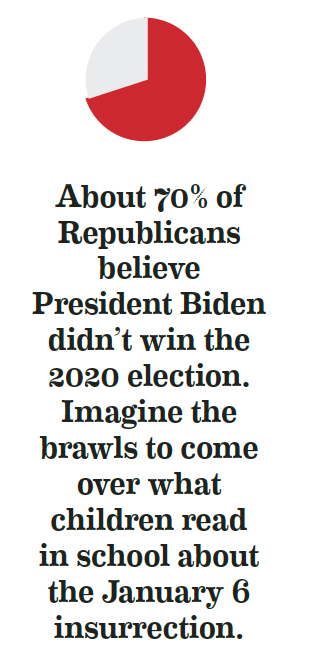
Either way, Smith professor Loretta Ross foresees a chilling effect on K–12 educators. “They will get severely punished as they try to teach students how to think and analyze, how to compare and contrast opinions,” she says. “People who want books to be banned also want only one point of view to be offered. It’s remarkably similar to brainwashing.”
The urge to restrict information can have far-reaching effects in unexpected ways. Consider a proposed law introduced by South Carolina state senators that would make it illegal to share information with pregnant women about how to obtain an illicit abortion “by telephone, internet, or any other mode of communication,” presumably including books and magazines. It would also be against the law to run a website that provides resources for ending a pregnancy.
Then there’s the fact that about 70% of Republicans believe President Biden didn’t win the 2020 election. Imagine the brawls to come over what children read in school about the January 6 insurrection. “We haven’t even talked about what we’re going to say to kids” about it, Knox notes. Which books will school libraries include, and what will textbooks convey?
Thurston worries that conservative federal judges, appointed over the past 30 years with lifetime tenure, will support more censorship. He believes book bans limit our sense of possibilities. “We lose the breadth of the horizons within which we can think, the worlds we can imagine, the ways of being in the world,” he says.
There are stories of hope for free-speech advocates. At the Millbury Public Library in Millbury, Massachusetts, a patron who checked out four books informed the library that she considered them to be inappropriate and didn’t plan to return them. All were stories with LGBTQ themes. One former library trustee responded by starting a book drive to acquire several copies of each title. Word spread, and people pledged 250 copies to stock that library and many others in Massachusetts.
These days, the venom directed against librarians could be enough to make some students think twice about entering the profession. Not Julia Cornick ’21, a children’s and young adult specialist at Forbes Library in Northampton. She plans to pursue a master’s degree in library science. “I didn’t know you could really love work until I started working in a library,” she says.
The majority of librarians are women, a fact that shouldn’t be overlooked. “Other people feeling qualified to tell women in female-dominated fields how to do their jobs is an all-too-familiar phenomenon,” Cornick says. She’s not deterred. “The more book bans there are, the more we need librarians who will get books into kids’ hands and care about diverse authors and honesty in books.”
Andrea Cooper ’83 is a frequent contributor to the Smith Alumnae Quarterly. She has written for The New York Times, Vogue, Sierra, Time, and many other national publications.
Democracy in Distress
A Special Series
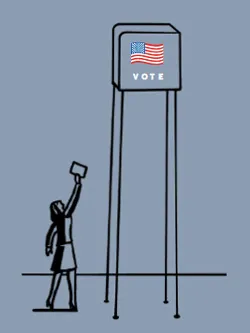
Introduction by Erin Pineda
What is democracy? This seemingly simply question has a seemingly obvious answer: It means, literally and etymologically, that the people rule themselves. But this straightforward reply leads to a tangle of thorny questions: How, exactly, are the people meant to rule themselves? What institutions and procedures enable the people’s rule? Are there limitations on the exercise of popular power—on what the people can elect to do?
PART 1: My Body, But Not My Choice by Andrea Cooper ’83
Navigating a post-Roe world with Candace Gibson ’07 of the National Latina Institute for Reproductive Justice and Genevieve Scott ’06 of the Center for Reproductive Rights.
PART 2: Block the Vote by Andrea Cooper ’83
Voter suppression laws are on the rise. But Smithies are fighting back, working to expand political participation by eliminating ballot restrictions and empowering disenfranchised voters.
PART 3: BANNED by Andrea Cooper ’83
The debate over what constitutes “appropriate” content jeopardizes the open exchange of ideas.
Illustration by Anthony Russo
